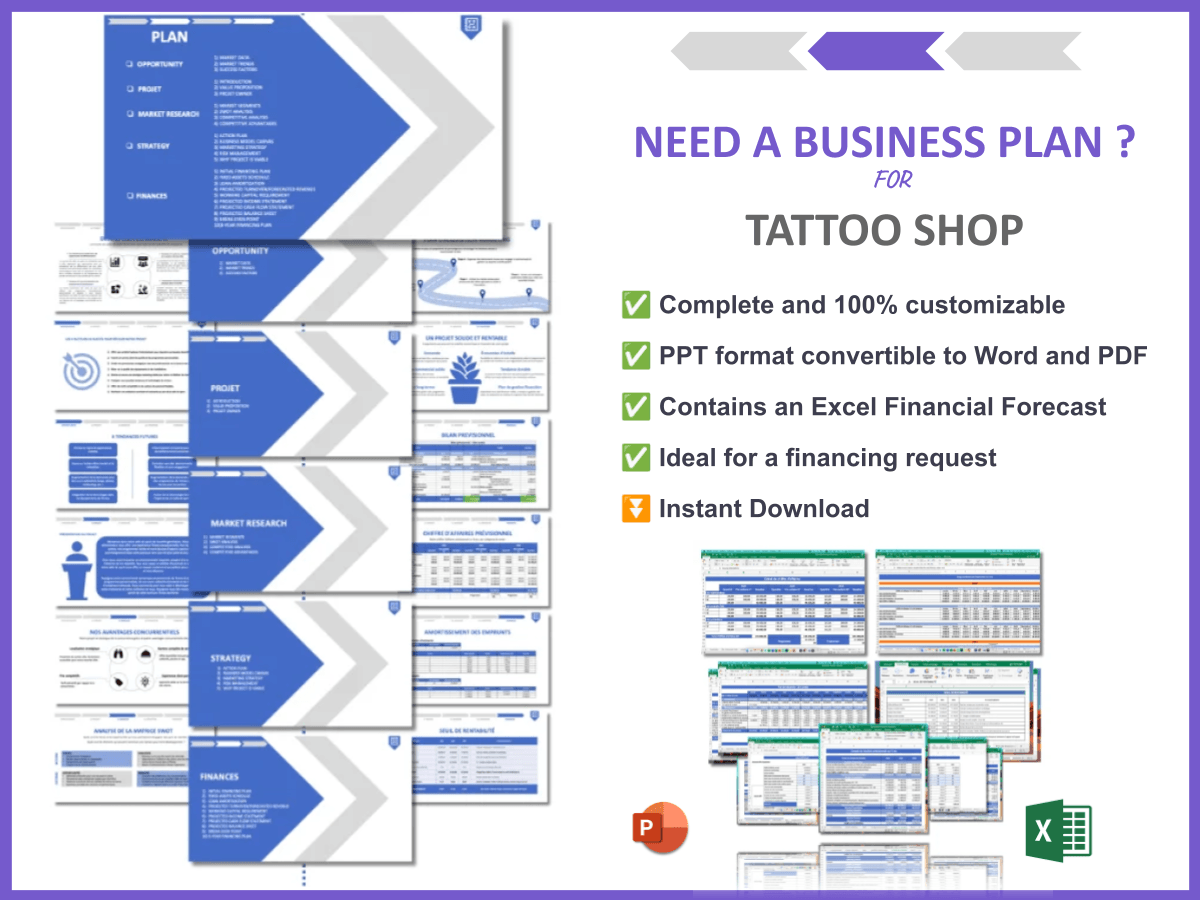Are you thinking about starting your own tattoo shop? You’re not alone! The tattoo industry has seen a remarkable growth of over 20% in recent years, with many aspiring artists looking to turn their passion into a profitable business. How to Start a Tattoo Shop is a question that many creative individuals ponder as they dream of inking their designs on clients. This article will guide you through the essential steps to launch your own successful tattoo business.
- Understanding the tattoo industry landscape
- Researching local competition and market demand
- Choosing a unique name for your shop
- Creating a comprehensive business plan
- Legal considerations and permits
- Marketing strategies for your tattoo shop
1. What Does It Take to Start a Tattoo Shop?
Starting a tattoo shop requires a blend of artistic talent, business savvy, and a strong understanding of the industry. Here are some key components to consider:
- Artistic Skills: You must possess a high level of skill in tattooing, as well as a distinct style that sets you apart.
- Business Acumen: Understanding how to manage finances, marketing, and customer relations is crucial for success.
- Industry Knowledge: Familiarize yourself with the latest trends, techniques, and equipment in the tattoo world.
Additionally, being passionate about the art of tattooing and having a genuine interest in your clients’ stories can go a long way. It’s not just about the ink; it’s about creating meaningful connections through your work.
2. Research Your Local Market and Competition for Your Tattoo Shop
Before you jump into the tattoo business, it’s essential to conduct thorough research on your local market and existing competitors. Understanding your environment will give you a competitive edge and help you identify opportunities. Here are some steps to follow:
- Analyze Local Demand: Look for trends in tattoo popularity in your area. Are there specific styles that are gaining traction?
- Assess Competitors: Visit other tattoo shops in your vicinity. Take note of their strengths and weaknesses, and think about how you can differentiate your shop.
- Identify Gaps: Is there a niche or specific service that isn’t being offered? This could be your opportunity to shine.
To help visualize your competition, consider creating a comparison table:
| Competitor | Strengths | Weaknesses |
|---|---|---|
| Ink & Art Studio | Highly skilled artists | Limited availability |
| Tattoo Haven | Great customer service | Basic designs only |
| Urban Ink | Diverse styles | High prices |
By conducting this research, you can position your tattoo shop as a unique and desirable option in the local market. It’s about finding that sweet spot where your skills meet the needs of your potential clients.
3. Choose a Unique and Memorable Name for Your Tattoo Shop
Your tattoo shop’s name is your first impression and can significantly impact your branding. A strong, unique name will attract clients and reflect the essence of your artistry. Here are some tips to help you choose the perfect name:
- Reflect Your Style: Your name should resonate with your artistic style. For example, if you specialize in intricate designs, consider a name that hints at detail and precision.
- Keep It Simple: A name that is easy to remember and pronounce will help clients refer you to others. Avoid overly complicated words.
- Check Availability: Before settling on a name, ensure that the domain and social media handles are available. This will be crucial for your online presence.
Consider brainstorming a list of potential names and testing them out with friends or family. Their feedback can be invaluable in finding a name that resonates.
| Potential Name | Pros | Cons |
|---|---|---|
| Inked Dreams | Memorable and creative | May sound generic |
| Artistic Needles | Unique and descriptive | Longer name |
| Skin Canvas | Evokes imagery | May not indicate tattooing |
4. Create a Comprehensive Business Plan for Your Tattoo Shop
Writing a solid business plan is one of the most critical steps in learning how to start a tattoo shop. A business plan helps you clarify your vision, set goals, and develop strategies for success. Here’s what to include in your plan:
- Executive Summary: A brief overview of your business concept and what makes it unique.
- Market Analysis: Insights from your research on the local market, competitors, and target audience.
- Marketing Strategy: How you plan to attract clients and promote your tattoo shop.
- Financial Projections: Estimated start-up costs, revenue forecasts, and break-even analysis.
For a detailed guide on creating your business plan, I recommend checking out this business plan template for Tattoo Shop. It’s super detailed and can save you a ton of time!
Don’t forget, your business plan is a living document. You should revisit and update it regularly as your business grows and evolves.
5. Decide on the Legal Structure for Your Tattoo Shop
Choosing the right legal structure for your tattoo shop is a crucial step that can affect your taxes, liability, and overall business operations. Here’s a breakdown of the most common structures:
- Sole Proprietorship: This is the simplest form, where you are the sole owner. It’s easy to set up, but you have unlimited liability, meaning your personal assets are at risk.
- Limited Liability Company (LLC): An LLC offers protection from personal liability while allowing flexibility in management. It’s more complex to set up but provides a safety net for your personal assets.
- Corporation: This structure is more formal and involves more regulations, but it can be beneficial if you plan to expand your business significantly.
Consider your long-term goals and consult with a legal advisor to determine the best option for your specific situation. Here’s a comparison table to help visualize the pros and cons:
| Legal Structure | Pros | Cons |
|---|---|---|
| Sole Proprietorship | Simple setup, full control | Unlimited personal liability |
| LLC | Limited liability, flexible management | More paperwork and fees |
| Corporation | Separate legal entity, easier to raise funds | Complex structure, double taxation |
6. Secure Funding and Financial Resources for Your Tattoo Shop
Securing funding for your tattoo shop can be one of the most challenging aspects of starting your business. Here are several options you can explore:
- Personal Savings: Using your own savings is a straightforward way to fund your startup, but it comes with risks.
- Bank Loans: Traditional loans from banks can provide the necessary capital, but you’ll need a solid business plan and good credit.
- Crowdfunding: Platforms like Kickstarter or GoFundMe can help you raise funds while also building a community around your brand.
- Investors: If you have a compelling business idea, consider attracting investors who can provide capital in exchange for equity.
Whichever route you choose, ensure that you have a clear understanding of your financial needs and a realistic plan for repayment or return on investment. Having a solid financial foundation will set the tone for your business’s success.
7. Register Your Tattoo Shop to Make It Official
Once you’ve decided on a name and legal structure for your tattoo shop, the next step is to officially register your business. This process varies by location, but here are the general steps you should follow:
- Choose Your Business Name: Make sure your chosen name is not already in use by another business. You can usually check this through your local business registry.
- File for a DBA: If you plan to operate under a name different from your legal business name, you’ll need to file a “Doing Business As” (DBA) form.
- Register with State Authorities: Depending on your state, you may need to file specific paperwork to officially register your business.
- Consider Trademarking: If you want to protect your brand name and logo, consider applying for a trademark.
By completing these steps, you’ll ensure that your tattoo shop is recognized as a legitimate business, paving the way for future growth and success.
8. Obtain Necessary Licenses, Permits, and Tax Identification Numbers for Your Tattoo Shop
Before you start inking, you must ensure that you have all the necessary licenses and permits. This is crucial for legal compliance and maintaining a good reputation in the tattoo industry. Here’s what you typically need:
- Health Permits: Most states require tattoo shops to obtain health permits to ensure hygiene and safety standards are met.
- Business License: A general business license is often required to operate legally in your city or county.
- Tax Identification Number: You’ll need an Employer Identification Number (EIN) for tax purposes, which can be obtained through the IRS.
Additionally, some states may have specific regulations for tattoo artists, including certification or apprenticeship requirements. Make sure to check with your local health department and state regulations to ensure compliance.
9. Apply for Business Insurance Coverage for Your Tattoo Shop
Protecting your tattoo shop with the right insurance coverage is essential for safeguarding your business and personal assets. Here are the types of insurance you should consider:
- General Liability Insurance: This protects your business against claims of bodily injury or property damage that may occur on your premises.
- Professional Liability Insurance: Also known as errors and omissions insurance, this covers you in case a client claims that your work caused them harm or dissatisfaction.
- Property Insurance: This covers damage to your equipment, furniture, and other property due to events like theft or fire.
To help you understand your insurance needs, here’s a simple comparison table of different types of coverage:
| Type of Insurance | Coverage | Importance |
|---|---|---|
| General Liability | Bodily injury, property damage | Essential for any business |
| Professional Liability | Claims of negligence | Important for service-based businesses |
| Property Insurance | Damage to business property | Crucial for asset protection |
Consulting with an insurance agent familiar with the tattoo industry can help you find the right coverage tailored to your specific needs.
10. Set Up Your Financial Management Systems for Your Tattoo Shop
Effective financial management is crucial for the success of your tattoo shop. Here are some key components to consider:
- Accounting Software: Invest in reliable accounting software to track your income, expenses, and profits. This will help you manage your finances more efficiently.
- Budgeting: Create a budget that outlines your expected expenses and revenues. This will help you stay on track and make informed financial decisions.
- Tax Preparation: Set aside funds for taxes throughout the year. Consider hiring an accountant to ensure you comply with tax laws and maximize deductions.
Establishing a solid financial management system from the start will help you avoid potential pitfalls and keep your tattoo shop thriving. Remember, the key to success is not just about making money but also managing it wisely!
11. Establish Your Brand Identity for Your Tattoo Shop
Your brand identity is what sets your tattoo shop apart from the competition and helps you connect with your target audience. Here are some steps to create a strong brand identity:
- Create a Unique Logo: A visually appealing logo that reflects your style and the essence of your shop is vital. It will be used on your website, business cards, and merchandise.
- Define Your Brand Voice: Your brand voice should resonate through all your communications, from social media posts to customer interactions. Decide whether you want to be professional, casual, or quirky.
- Develop a Consistent Color Palette: Choose colors that represent your brand and use them consistently across all marketing materials.
Consider creating a brand style guide that outlines your logo, color palette, and voice to ensure consistency across all platforms. This will help build trust and recognition among your clients.
12. Market and Advertise Your Tattoo Shop Effectively
Getting the word out about your tattoo shop is crucial for attracting clients. Here are some effective marketing strategies:
- Social Media Marketing: Platforms like Instagram and Facebook are perfect for showcasing your work. Regularly post high-quality images of your tattoos and engage with your followers.
- Local Advertising: Consider advertising in local magazines or community boards. Sponsoring local events can also increase your visibility.
- Referral Programs: Encourage satisfied clients to refer their friends by offering discounts or incentives for successful referrals.
To track the effectiveness of your marketing efforts, set clear goals and use analytics tools to measure success. Adjust your strategies based on what works best for your audience.
13. Assemble Your Team for Your Tattoo Shop
Having a skilled and passionate team is essential for the success of your tattoo shop. Here are some tips for building your team:
- Define Roles Clearly: Determine what roles you need to fill, such as tattoo artists, receptionists, and cleaning staff. Make sure everyone understands their responsibilities.
- Conduct Thorough Interviews: Look for candidates who not only have the necessary skills but also share your vision and values. Assess their portfolio and ask about their experience.
- Provide Training and Support: Once you’ve hired your team, offer training to ensure they understand your shop’s policies and procedures. Create a supportive environment that encourages growth and collaboration.
Building a strong team can enhance the overall experience for your clients and contribute to the long-term success of your tattoo shop. Remember, your staff is a reflection of your brand, so invest in their development!
Conclusion
Opening a tattoo shop can be an incredibly rewarding venture that allows you to express your creativity while building a business. By following the steps outlined in this guide, from conducting market research to assembling a talented team, you’ll be well-equipped to navigate the challenges of the tattoo industry. Remember, a solid foundation is key to long-term success.
For further insights, I encourage you to check out our articles on how to create a SWOT Analysis for Tattoo Shop and How to Initiate a Tattoo Shop Marketing Plan? With Example. These resources will provide you with valuable strategies to enhance your business planning and marketing efforts!
FAQ
- What are the initial costs to start a tattoo shop?The initial costs can vary widely, typically ranging from $10,000 to $50,000. Expenses include equipment, licensing, insurance, and rent.
- Do I need a license to operate a tattoo shop?Yes, most states require tattoo shops to obtain specific licenses and permits to ensure compliance with health and safety regulations.
- How do I find clients for my tattoo shop?Utilize social media platforms, local advertising, and referral programs to attract clients. Showcasing your work online can significantly boost your visibility.
- What types of insurance do I need for my tattoo shop?Essential insurance types include general liability, professional liability, and property insurance to protect your business and assets.
- How can I create a unique brand for my tattoo shop?Your brand should reflect your artistic style. Create a distinctive logo, define your brand voice, and maintain a consistent color palette across all marketing materials.
- What is the best way to market my tattoo shop?Social media marketing, local advertising, and establishing referral programs are effective strategies for promoting your tattoo shop.
- How do I set prices for my tattoo services?Research your competitors and consider factors such as your experience, the complexity of designs, and your overhead costs to determine competitive pricing.
- How can I ensure the safety and hygiene of my tattoo shop?Follow local health regulations, maintain a clean environment, use sterilized equipment, and train your staff on hygiene practices.
- What are the most popular tattoo styles?Popular styles include traditional, realism, watercolor, and tribal. It’s essential to find a niche that reflects your artistic strengths.
- How do I create a business plan for my tattoo shop?Include an executive summary, market analysis, marketing strategy, and financial projections in your business plan. Resources like business plan templates for Tattoo Shop can be helpful.







